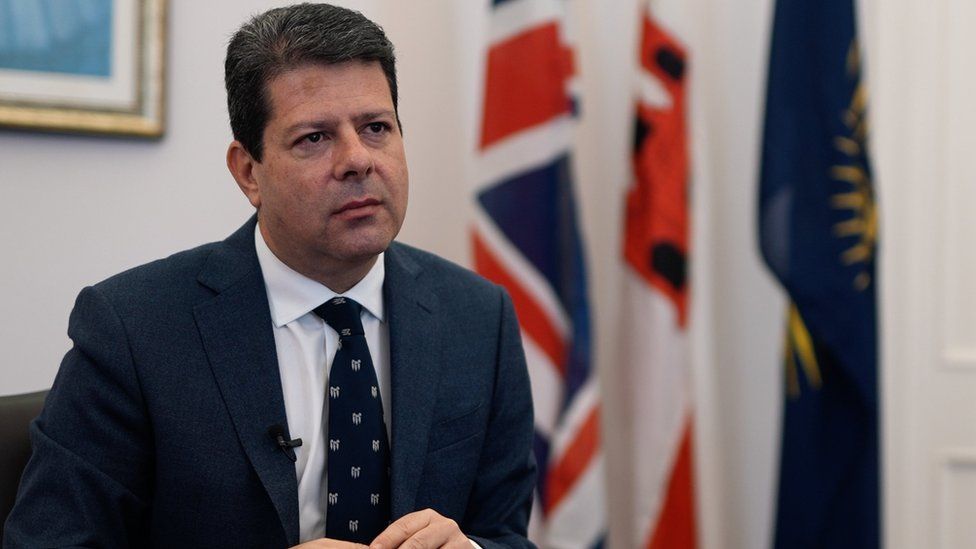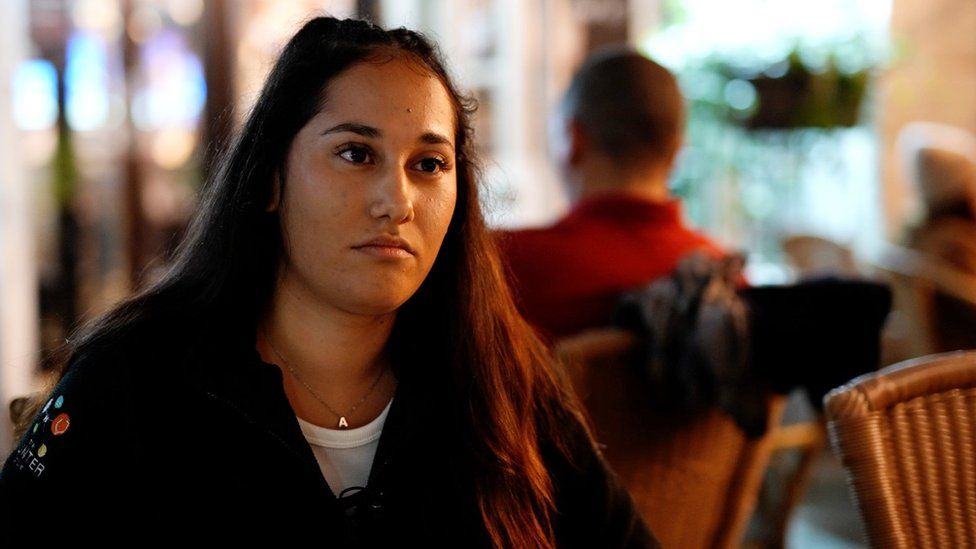BBC News 25 January 2023
Uncertain Brexit negotiations over a contested border, a troubled past, debates over sovereignty. It might sound familiar, but we're not talking about Northern Ireland.
"I don't care if this is English, British or even French, we would just like to live together and have a pleasant life. We don't care about politics," says Jose. He is one of the many thousands of workers who make the journey into Gibraltar every day from Spain. He's been doing it for 30 years, working mostly in hospitality.
The small but significant British overseas territory lies at the southern end of the Iberian peninsula. It was not included in the permanent post-Brexit deal which now governs the UK's relations with the EU. Instead, it has been operating on ad hoc arrangements.
The people of Gibraltar are fiercely patriotic, often called "more British than the British". But the reality is more complex.
The territory voted by 96% to stay part of the EU in 2016's referendum.
English is the official language, but people also speak Spanish, often switching between the two in a form of code switching they call Llanito.
Thousands of people cross the border regularly, to work, shop or to see family.
There is a great affection for Spain and its people, but an intense suspicion of the Spanish state.
It has meant that discussions over their future relationship have been sensitive, to say the least. The talks resume in London on Thursday.
Officially, they are between the UK and EU, but Gibraltar's chief minister Fabian Picardo is at the table too. It is he who will have to sell any deal, if one is reached, but he knows it will not be easy to please everyone.
We go to meet him at his office in Convent Place. Outside are two huge cannon; a clear reminder of the military origins of Gibraltar. A lawyer by trade, Mr Picardo is clear and confident in his answers. He says what's certain is that Gibraltar can't return to its pre-Brexit reality.
"[No deal would] be uncomfortable in some ways, but even a negotiated outcome is going to be uncomfortable in some ways because we have to get used to a different way of operating in the movement of goods, in our immigration system."
He may be being somewhat diplomatic in that assessment. Like almost everyone else in Gibraltar, he was a staunch advocate of remain.
"I'm not a diplomat. I'm a politician. I tell it as it is. But I'm also conscious that I'm involved in the negotiation and I'm not going to tell the other side all the difficulties we may have."
The talks have been shrouded in secrecy, but for Dr Jennifer Ballantine-Perera from the Gibraltar Garrison Library, the status of the border is at the heart of them.
"That border tells Gibraltarians in no uncertain terms that Gibraltar is not Spanish. And the border also avoids any slippage into Spain."
She is clear on what she believes is most important to people here: "There's no erosion of British sovereignty and that is reflected in how the border is managed."
That doesn't mean the border should be impenetrable.
At Saccone and Speed, a wine merchant operating in Gibraltar since 1839, Guy Povedano stands in his cavernous warehouse, in the shadow of hundreds of barrels of beer. His business depends on tourists and workers coming through from Spain and he hopes a new agreement will ensure a free-flowing movement of people.
"[I'd like] an agile border," he says. "A workable border where we can get the goods in but where there's an element of control." By his own admission, he wants the best of both worlds.
Sharon and Alex are an example of how people's everyday lives are intimately linked to both sides of the border.
Sharon works in a pub in Gibraltar, but is from La Linea just across the border in Spain. Her boyfriend Alex is with the Royal Navy, on a ship moored just off the coast. The thought of the crossing getting harder fills her with dread.
"It will be terrible. He has to work. I have to work. I have to study. For the people that have to come to work here, they will be late and I will be late for sure. So it [would be] impossible to work, to have a normal life."
In theory, there is no "cliff edge" to the talks. In theory, the temporary agreements made in 2020, which currently see fairly free movement, could simply continue. There is, however, a political reality on the horizon that means a deal needs to be secured soon.
Later this year, Spain will elect a new government. The incumbent Socialists are generally seen as more sympathetic to Gibraltar. If they are replaced with the Popular Party, potentially with the backing of the far-right Vox, any goodwill may go out the window.
That is why talk of what "no-deal" might look like is vital, with Mr Picardo claiming it could bring opportunities. He mentions the pre-Brexit idea of turning London into "Singapore-on-Thames", a low-tax, light-regulation business haven.
"Gibraltar is not looking to become that, but there are opportunities - given you are not in the EU-regulated space - if you become Singapore-on-Straits."
Is that a warning to Brussels?
"I'm not here to threaten, I'm not here to cajole. I think our best efforts should be directed at having a treaty between the United Kingdom and the European Union on Gibraltar."
Both sides have agreed that sovereignty of the Rock is not on the table in these negotiations, but people of the British overseas territory still approach the talks with great trepidation.
For many of them, their division from Spain is more important than any other issue, even the economy.
Principle comes up against pragmatism, with one potentially having to lose out. If that situation sounds familiar - maybe it is.



